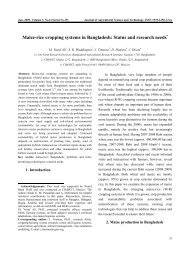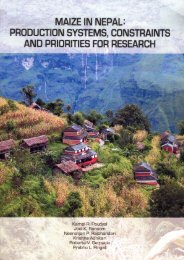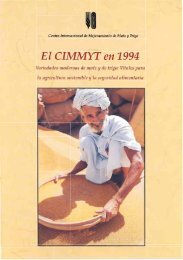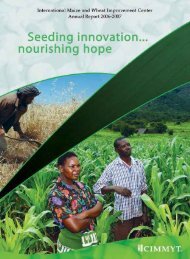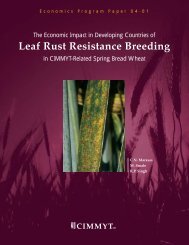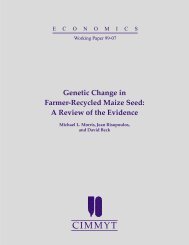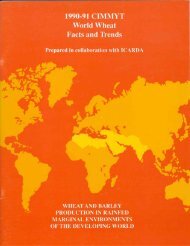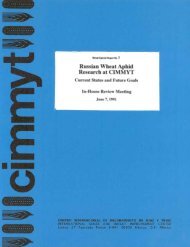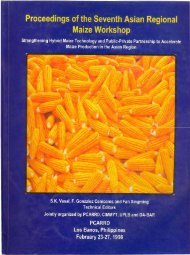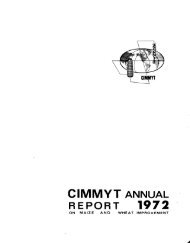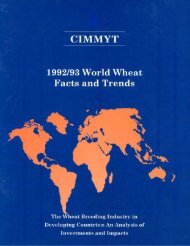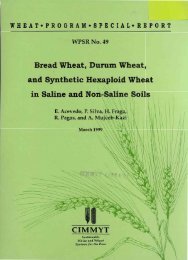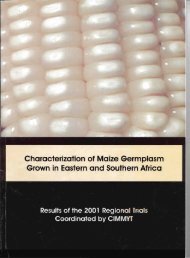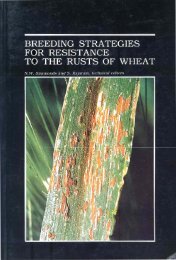the Symposium on Wheats for More Tropical Environments - cimmyt
the Symposium on Wheats for More Tropical Environments - cimmyt
the Symposium on Wheats for More Tropical Environments - cimmyt
- No tags were found...
You also want an ePaper? Increase the reach of your titles
YUMPU automatically turns print PDFs into web optimized ePapers that Google loves.
303V. Ec<strong>on</strong>omicsWheat in <str<strong>on</strong>g>the</str<strong>on</strong>g> Tropics:Ec<strong>on</strong>omic and Policy IssuesD. Byerlee, Ec<strong>on</strong>omics Program, CIMMYT, Islamabad, PakistanAbstractInterest in wheat producti<strong>on</strong> in <str<strong>on</strong>g>the</str<strong>on</strong>g> warmer tropics stemsfrom rapidlyincreasing wheat c<strong>on</strong>sumpti<strong>on</strong> and imports in many tropical countries. Onebilli<strong>on</strong> people in <str<strong>on</strong>g>the</str<strong>on</strong>g> tropical belt (23 ON to 23°5) now c<strong>on</strong>sume over 22 milli<strong>on</strong>t<strong>on</strong>s of wheat, 83% of which is imported. In many tropical countries. wheat(usually bread) has become <str<strong>on</strong>g>the</str<strong>on</strong>g> staplefood. especially of urban c<strong>on</strong>sumers.Wheat c<strong>on</strong>sumpti<strong>on</strong> has increased because ofc<strong>on</strong>sumers' rising incomes andinterest in c<strong>on</strong>veniencefoods and a diversified diet. <strong>More</strong> importantly.governments have encouraged rapid increases in wheat c<strong>on</strong>sumpti<strong>on</strong> throughfavorable pricing policies<strong>for</strong> bread. including subsidies in many countries.Exporting countries have also promoted wheat c<strong>on</strong>sumpti<strong>on</strong> through exportpromoti<strong>on</strong> andfood aid. Large-scale investments in capital-intensive milling andbaking industries have entrenched interest in c<strong>on</strong>tinuing wheat imports.Governments c<strong>on</strong>cerned about rising wheat imports should c<strong>on</strong>sider policyalternatives as part ofan integratedfood policy analysis that includes c<strong>on</strong>sumerprice policies<strong>for</strong> bread and competing staples. cereal import andfood-atdpolicies. removal of incentives to <str<strong>on</strong>g>the</str<strong>on</strong>g> milling industry. promoti<strong>on</strong> of n<strong>on</strong>wheatfood staples. including compositeflours. and increased domestic agriculturalproducti<strong>on</strong>. Domestic wheat producti<strong>on</strong> is <strong>on</strong>ly <strong>on</strong>e alternative<strong>for</strong> increasingagricultural producti<strong>on</strong>. The comparative advantageframework enables anassessment of <str<strong>on</strong>g>the</str<strong>on</strong>g> real returns to <str<strong>on</strong>g>the</str<strong>on</strong>g> country of resources used in wheatproducti<strong>on</strong> versus alternatives. These returns are likely to be highest wherewheat enables an increase in cropping intensity. using available land. labor.water and mechanical services to a fuller capacity. The place of wheat in <str<strong>on</strong>g>the</str<strong>on</strong>g>farming system also needs to be carefully evaluated. with particular attenti<strong>on</strong> to<str<strong>on</strong>g>the</str<strong>on</strong>g> need<strong>for</strong> timely planting. which is critical<strong>for</strong> successful wheat producti<strong>on</strong> in<str<strong>on</strong>g>the</str<strong>on</strong>g> warmer tropics. These ec<strong>on</strong>omic issues should be addressed at an earlystage in any proposed wheat c<strong>on</strong>sumpti<strong>on</strong>/producti<strong>on</strong> program.Most people in <str<strong>on</strong>g>the</str<strong>on</strong>g> industrializedcountries begin <str<strong>on</strong>g>the</str<strong>on</strong>g>ir day with a cup oftea or coffee. whose major ingredientsoriginated <strong>on</strong> a small farm or plantati<strong>on</strong>in <strong>on</strong>e of <str<strong>on</strong>g>the</str<strong>on</strong>g> tropical countries. such asBrazil. Ivory Coast or Sri Lanka. At <str<strong>on</strong>g>the</str<strong>on</strong>g>same time. <str<strong>on</strong>g>the</str<strong>on</strong>g> people of <str<strong>on</strong>g>the</str<strong>on</strong>g>se tropicalcountries. especially those in urbanareas. are likely to begin <str<strong>on</strong>g>the</str<strong>on</strong>g>ir day withbread <strong>for</strong> breakfast. bread made fromwheat grown <strong>on</strong> <str<strong>on</strong>g>the</str<strong>on</strong>g> fanns of <strong>on</strong>e of <str<strong>on</strong>g>the</str<strong>on</strong>g>industrialized countries. At first sight.this may appear to be a reas<strong>on</strong>ableexchange. but closer examinati<strong>on</strong> raisesa number of disturbing questi<strong>on</strong>s.Unlike tea or coffee. bread has becomea basic food staple to many people in<str<strong>on</strong>g>the</str<strong>on</strong>g> tropics. proViding a significantproporti<strong>on</strong> of <str<strong>on</strong>g>the</str<strong>on</strong>g>ir calories. not <strong>on</strong>ly <strong>for</strong>breakfast but also <strong>for</strong> lunch and.sometimes. dinner as well. Wheatimports by many tropical countries aregrOWing very rapidly. and nowc<strong>on</strong>stitute a significant proporti<strong>on</strong> of<strong>for</strong>eign exchange expenditures. Whilepeople in <str<strong>on</strong>g>the</str<strong>on</strong>g> tropical countries may notbe "addicted" to bread in <str<strong>on</strong>g>the</str<strong>on</strong>g> same wayas are <str<strong>on</strong>g>the</str<strong>on</strong>g> coffee and tea drinkers. <str<strong>on</strong>g>the</str<strong>on</strong>g>yare increasingly dependent <strong>on</strong> bread <strong>for</strong>




